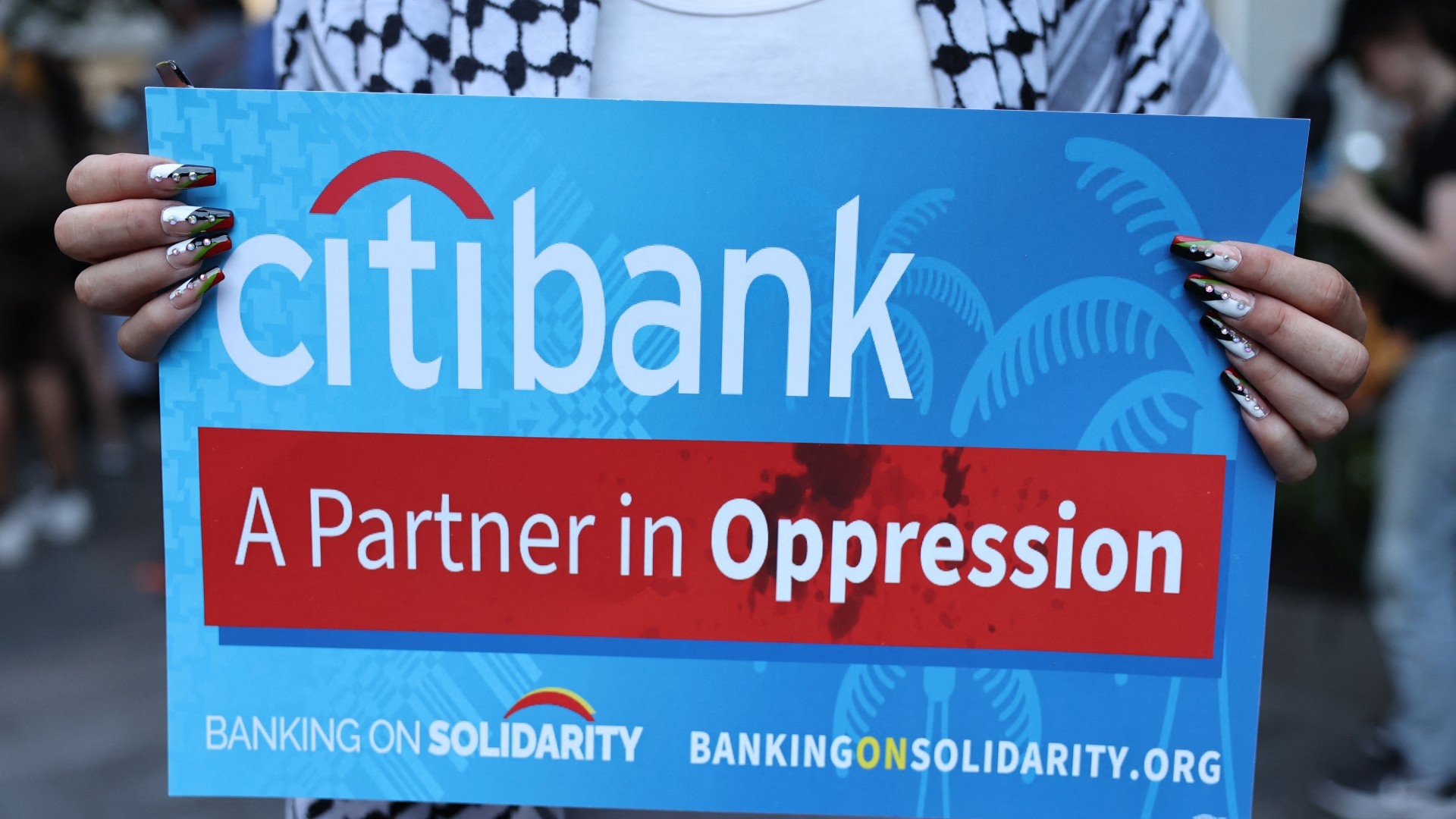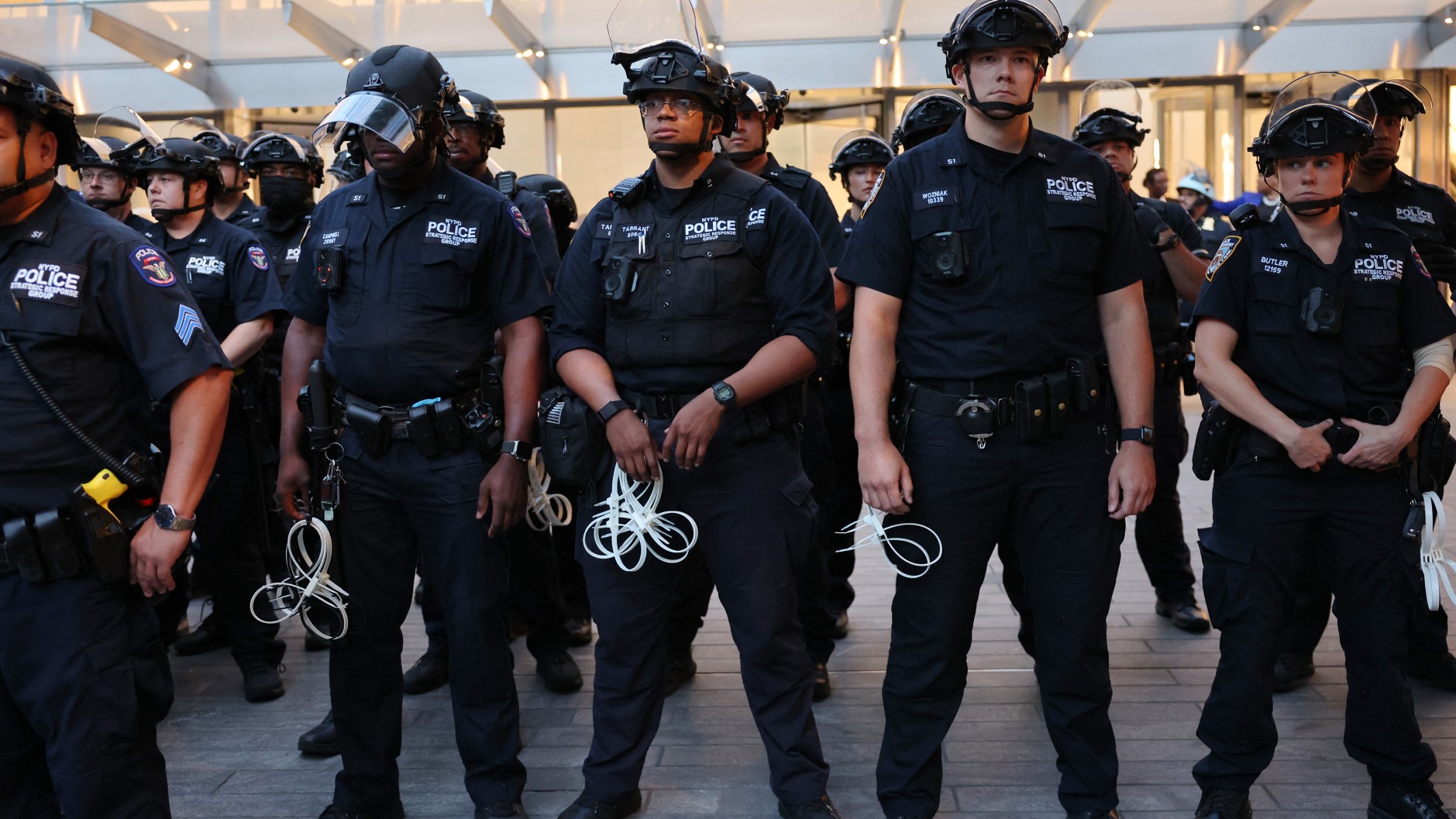Pro-Palestine and climate justice movements converge against Citigroup in New York

Hundreds of protesters have been gathering outside the Citigroup Headquarters in New York City to demand the company cut ties with Israel, as well as fossil fuel and weapons manufacturing industries.
Activists say the protests are a sure sign that the movements for Palestinian liberation and climate justice are fast intersecting as Israel continues its war on Gaza with the full support of the US political and business elite.
Titled "Summer of Heat on Wall Street", the 12-week-long campaign against Citigroup, including its subsidiary, Citibank, that began on 10 June, calls on the institution to stop funding fossil fuels, exponentially increase financing for renewable energy, respect human rights and indigenous sovereignty, and issue climate reparations.
"We understand that there is no climate justice without a free Palestine," Liv, an organiser with the Summer of Heat on Wall Street campaign, told Middle East Eye.
New MEE newsletter: Jerusalem Dispatch
Sign up to get the latest insights and analysis on Israel-Palestine, alongside Turkey Unpacked and other MEE newsletters
"Palestinians will be the first people to experience the harshest impacts of climate change," Liv, who provided only their first name, added.
The campaign has been endorsed by over 100 organisations, including ANSWER Coalition, Extinction Rebellion United States and the Sunrise Movement.
Earlier in June, the local chapter of the Palestinian Assembly for Liberation (PAL-Awda-NY/NJ) launched its own campaign against Citibank over the institution's self-proclaimed "leadership and commitment to Israel".
The group is calling on Citibank customers to close their accounts and cancel their credit cards.
Why Citibank?
According to its website, Citibank "boasts the largest presence of any foreign financial institution in Israel and offers corporate and investment banking services to leading Israeli corporations and institutions and global corporations operating in Israel".
In 2013, Citi established its "Innovation Lab" in Tel Aviv, which works closely with Citi's accelerator program and cybersecurity lab and supports Israeli start-ups specialising in financial tech.
According to PAL-Awda, in 2021, Citibank loaned Israel $2.5bn to buy 25 F-35 fighter jets.
A 2023 congressional report on US foreign aid to Israel corroborates this claim, citing the Israeli Ministry of Defence's use of Foreign Military Financing (FMF) from the US to secure a loan from "a small consortium led by Citibank" to purchase F-35 fighter jets from US defence contractor Lockheed Martin.
"Those jet fighters are now waning death and destruction on Gaza, on hospitals, on schools, on churches, on homes, on people living in tents," Bill Dores, an organiser with PAL-Awda-NY/NJ, told MEE.
Climate activists say that Citbank is not just funding the current destruction in Gaza and ongoing occupation of Palestine, it is also the largest financier of fossil fuel expansion worldwide.
In a report released in May, a coalition of environmental groups found that Citibank invests around $25bn to the fossil fuel industry annually.
The report, "Banking on Climate Chaos", also submitted that since the signing of the Paris Agreement, the international climate change treaty signed in 2015, Citibank has spent $396bn on the fossil fuel industry.
Layla, an organiser with the Palestinian Youth Movement (PYM) in NYC, described the climate crisis and devastation in Palestine as inextricably intertwined.
"The corporations and institutions that are profitting off of the genocide and the ongoing war and are also profitting off of the destruction of the environment and the planet," Layla, who only provided her first name, told MEE.
Citibank did not reply to MEE's request for comment by time of publication.
Activists say that this link has been further exemplified since 7 October, with recent research showing that emissions generated within the first two months of Israel's war on Gaza surpassed those of nearly two dozen of the world's most climate-vulnerable countries.
Around 99 percent of the estimated 281,000 metric tonnes of carbon dioxide generated in the first 60 days of the war was due to Israel's aerial bombardment and ground invasion of Gaza. It said that it was equivalent to burning at least 150,000 tonnes of coal.
Meanwhile, weeks into the bombing campaign, Israel simultaneously awarded six companies 12 licences to explore natural gas fields off the coast of the besieged territory.
Israel's decision to pump seawater into the ground in Gaza and its use of white phosphorus during military operations have also come under heavy criticism for their potentially devastating ecological effects.
For decades, Israel's occupation infrastructure and illegal uprooting of native Palestinian olive trees have threatened similar irreversible harm to the region's environment.
From Apartheid South Africa to apartheid Israel
Citigroup has been in the crosshairs of political activists for decades.
According to the New York Times, it was Citigroup that pressured the United States into occupying Haiti in 1915.
In 1987, it was the last American bank to halt its operations in Apartheid South Africa.
While the institution denies that the boycott campaign against Apartheid South Africa played a role in its decision to leave the country, organisers argue otherwise.
"This is a tactic that's worked with other banks divesting from fossil fuels. This is also a tactic that's worked with getting Citi to divest from apartheid South Africa," Liv told MEE.
"If it wasn't for immense and concentrated and repetitive pressure, then they wouldn't have done it."
On Tuesday, 18 additional protesters were arrested after staging an encampment - a tactic seen at college campuses across the US - outside the Citigroup headquarters.
As members of the New York Police Department formed a protective line in front of nearby pro-Israel counterprotesters, the NYPD's Strategic Response Group, outfitted in riot gear, descended on the demonstrators.
Despite numerous arrests, protesters show no signs of slowing down as they enter the third week of the "Summer of Heat".
On Friday morning, youth organisers and their allies blockaded every entrance of the Citigroup headquarters in New York, preventing employees from getting to work.
On 28 June, demonstrators will travel from around the US to engage in nonviolent actions outside the building in what organisers "expect will be one of the largest mass climate civil disobedience actions in this country for several years".
"We know our struggles are interconnected. Our victory is one and our enemy is one," Layla said.
"We have a collective responsibility to our people back home to be organised, unified and mobilised to put an end to this genocide."
Middle East Eye delivers independent and unrivalled coverage and analysis of the Middle East, North Africa and beyond. To learn more about republishing this content and the associated fees, please fill out this form. More about MEE can be found here.


